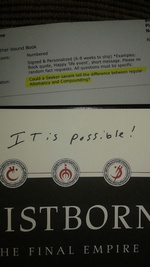Brandon Sanderson
Chapter Four - Part One
Ah, the introductions. I worry that this scene is a little too long, and perhaps a little too obvious, as we bring in the separate members of the crew. However, it seemed like the best way, and it adheres a little bit to the heist genre framework I'm using.
My favorites of the group are, of course, Ham and Breeze. I knew I wanted to use a smaller crew than you see in some heist stories–I wanted to get to know them better, and deal with them more, than one has opportunity for in a movie like Ocean's Eleven. Ham and Breeze, then, formed the basis for my group. Simply put, they're both guys who are fun to talk to. I can put them in a room with each other, or with Vin, and an interesting conversation will blossom.
I was a little worried about Ham when I first started writing him. The warrior philosopher is, perhaps, a character that you've seen before. In this case, I knew I wanted a character who could be a foil for Breeze. Since Breeze tends to be arrogant, long-winded, and manipulative, I came up with someone humble, long-winded, and kindly. Mix in a desire to understand the world, and a mind that thinks about things a little differently from others, and I had Ham. I think he turned out all right.

